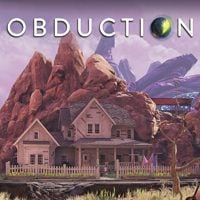Gameplay mechanics
Obduction is a combination of exploration and logic game. At each point of the game you must thoroughly examine all surroundings and try combining encountered objects into logic whole. As the action progresses, all aspects become more and more clear, but at the beginning you can be slightly disoriented by the size of the world, small number of available interactions and lack of an objective. You will spend most of your time on looking around and checking whether the available interactions can bring something to your situation. Below you will find useful information related to a few aspects of the world in which you will spend the first hours of the game.
Interactions
Before we get to the detailed description of the game world, we should focus on the interaction itself. In the main menu you can activate highlighting of all objects you can manipulate. Since the game isn't very clear, you should do it - thanks to that you won't miss anything important or interesting. In order to interact you use cursor and the process can be performed on a few levels. Below you can find descriptions of all types of interactions:
- Turn on / Turn off - a single-level interaction which doesn't require any additional activities except for activating the process. This interaction is related to all switches and buttons.
- Change position - in addition to pressing the interaction button, this action requires using one of the arrows. After starting the interaction an additional arrow appears next to the object and shows how you can interact, making the matter easier. This interaction is related to levers and valves.
- Two-level interactions - interacting with the object stops the camera on it. When that happens, you can perform a further action, which is usually one of the actions pointed above. Happens frequently when examining notes and scrapbooks.
Holograms

You can contact non-playable characters by using the holograms. After interacting you will see a message left by a person. The interaction is done by pressing the button on the pole related to the device that emits the sound and the image. The holograms can be activated many times in order to listen to the message again.
Notes

During the game, very frequently you will encounter single notes, notebooks and scrapbooks. All these objects are very important in telling the story of the game. They contain useful information that can be very helpful in riddle solving. You should always thoroughly read them.
Important: in case of the notebooks and scrapbooks you can turn the pages. Frequently on the next pages you can find important information. Because of that you should always try performing these actions while examining the mentioned objects.
Photos
Since there is no equipment system available in the game, you will have to memorize information found in notes or the location of some objects. Because of that, the game allows taking photos. You can store only fifteen of them. If you have two similar photos, you should remove the copy in order to avoid blocking the memory of the camera. Controlling this aspect is very important because the camera won't inform you about the lack of memory. Instead, it will take a photo which then you won't be able to open. This could be very troublesome and it might force you to return to an area which you already explored.
Portals
Each of the planets has a defined area on which you can travel freely. Once you destroy Mofangs Beam, you can reach previously unavailable areas on each of the planets, using the portal system. In case of Hunrath, portals look like violet walls, Kaptar has bronze walls, while Maray - white.
Portals can be easily recognized, thanks to their "fluidity". While standing next to them, you have an impression that the wall slightly ripples, and when you approach it, you can see what's behind it. It pays off to investigate such occurrence, and remember which portal takes us to a respective location. If you entered a portal by mistake, all you have to do is return and "enter the wall", and you'll find yourself in the place where you've been before.
Teleports
In the course of the gameplay, you'll stumble upon a number of teleporting machines. Using them is really easy, although time-consuming. The aforementioned mechanism is controlled by two main rules, that allow for a better understanding of their functions, and to predict the area in which we may appear.
![Each machine has two interactive objects: a lever[1] and a button[2] - Gameplay mechanics - Basics - Obduction Game Guide](/obduction/gfx/word/7979669.jpg)
Each machine has two interactive objects: a lever[1] and a button[2]. After moving the lever, the cover of the machine raises. If we stay in close proximity, we can notice that a circle has been drawn around the device. The circle determines how much of the area around the device will be transported to a different planet. Based on this assumption, we can deduct if the device will play a role in solving a riddle. The second important aspect is the color of the circle that has been drawn once the cover has been raised.
Gold - Hunrath
Green - Maray
Red - Mofang
Blue - Kaptar
On the basis of the circle, we can deduct whether we can transport our surroundings with us, and what planet is the destination of the journey.
You are not permitted to copy any image, text or info from this page. This site is not associated with and/or endorsed by the Cyan Inc. or Cyan Inc.. All logos and images are copyrighted by their respective owners.
Copyright © 2000 - 2025 Webedia Polska SA for gamepressure.com, unofficial game guides, walkthroughs, secrets, game tips, maps & strategies for top games.
